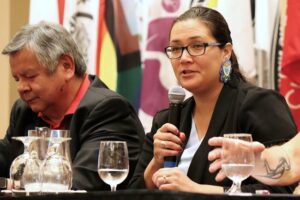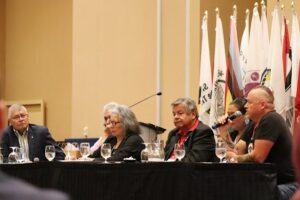Anishinabek Nation leaders discuss economic opportunities and sovereignty at forum

By Sam Laskaris
CHIPPEWAS OF RAMA FIRST NATION – Though some improvement has been made, Anishinabek Nation Grand Council Chief Linda Debassige believes plenty of work still needs to be done for others to learn about Indigenous issues.
Grand Council Chief Debassige was one of the featured speakers at the 2024 Anishinabek Nation Economic Development Opportunities Forum, which concluded on Oct. 23 at Casino Rama Resort in Chippewas of Rama First Nation.
Grand Council Chief Debassige spoke during the event’s Leadership Panel on Day 1 of the Forum.
“Historic injustices are something we have all faced since time immemorial,” she said. “We continuously advance and fight and negotiate and settle different aspects. Part of what needs to be done and should be done is education to government still and to industry as to what First Nations’ history is but also as part of that history, our inherent rights.”
Grand Council Chief Debassige said some politicians in particular do not have much knowledge about inherent rights.
“That’s where we run into a lot of challenges,” she said.
Grand Council Chief Debassige also said that after years of oppression, many Indigenous people are starting to realize they have strength and power to assert themselves in different economic opportunities.
“What we need to do is continue to advance our positions from a strengths-based approach, rooted in our understanding of what the truth was and what is wasn’t,” she said.
The panel also included Scott McLeod, Anishinabek Nation’s Lake Huron Regional Chief, who spoke about economic opportunities and challenges in his coverage area.
“First, we have to acknowledge that we come from a place of survival as First Nations because economic opportunities did not include First Nations,” he said. “We were suppressed. And so, we survived. We survived for decades on what little we had and we became very creative and very good at surviving.”

Lake Huron Regional Chief McLeod also said Indigenous people came out of their survival period to an era where they could live comfortably and have gotten to a plateau of job creation and economic development.
“Where we need to be heading now, we always talk about sovereignty, but we don’t necessarily talk about how do we get there? What is required?” he added. “Sovereignty comes at a cost and we can’t rely on government funds, grants, dollars and operating dollars to get there…Sovereignty, to me, means no reliance on government. It means being able to make our decisions for own Nations on our own, without having to report, without having to give money back that we didn’t use in a fiscal year, and only operating with those colonial minds, boundaries that are given to us by federal government.”
Marsha Smoke, the Anishinabek Nation’s Southeast Regional Chief, was also a panelist and she also spoke on the importance of sovereignty.
“We’re in a bit of a different environment when it comes to development,” she said. “We’re not in an area where we have a lot of resource developments such as mining, though there are a few active mines in southeastern Ontario. But also, we don’t have the industries like forestry, which are really being looked at in the north from outside interests…We’re basically the suburbs of the major cities, whether it’s Ottawa Valley, Kingston, and Toronto. We’re really in an area where the population is growing and expanding so quickly and move more into our territories.”
And that brings another set of challenges.
“The demands of our daily needs are being strained and it’s also something as the population moves more towards our home communities and our territories, there’s a strain on the infrastructure,” she said.
Meanwhile, another panelist, Anishinabek Nation’s Southwest Regional Chief Joe Miskokomon, said what is being classified as economic reconciliation by many is deceiving.
“Equity partnership is a business deal,” he said. “When you’re paying for it, it’s a straight business deal. Nothing has been reconciled.”
Southwest Regional Chief Miskokomon said that’s even though many believe progress has been made.
“There is no clear-cut definition to economic reconciliation,” he said. “And it means so many things to so many people that it can be twisted and contorted, changed so that it’s a mirage for economic reconciliation. But, it’s not there.”
The panel was moderated by former Anishinabek Nation Grand Council Chief and keynote speaker at the event John Beaucage.
Chippewas of Rama First Nation Chief Ted Williams was also on the panel. Among topics he covered was the importance of setting goals.


